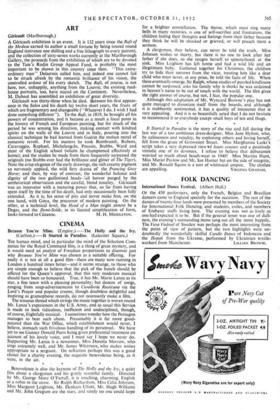CINEMA
Because You're Mine. (Empire.)—The Holly and the Ivy. (Carlton.)—It Started in Paradise. (Leicester Square.) THE human mind, and in particular the mind of the Selection Com- mittee for the Royal Command film, is a thing of great mystery, and it would need an analyst of .Freudian proportions to discover just why Because You're Mine was chosen as a suitable offering. For really it is not at all a good film—there are many now running in London a hundred times better—and it seems strange, to those who are simple enough to believe that the pick of the bunch should be offered for the Queen's approval, that this very moderate musical should have been so honoured. True, it has Mr. Mario Lanza as its star, a fine tenor with a pleasing personality; but dozens of songs, ranging from soap-advertisements to Cavalleria Rusticana via the Lord's Prayer and popular croons, though doubtless delightful and inspiring as gramophone records, do not necessarily make a film.
The tenuous thread which strings the music together is woven round Mr. Lanza's experiences in the U.S. Army, and as usual this Service is made to look ridiculous, inefficient and undisciplined, though, of course, frightfully musical. I sometimes wonder how the Pentagon manages to bear such abuse. Presumably it is far more good- natured than the War Office, which establishment would never, I believe, stomach such frivolous handling of its personnel. We have yet to see Gunner Donald Peers being given preferential treatment on account of his lovely 'voice, and I must say I 'hope we never do. Supporting Mr. Lanza is a newcomer, Miss Doretta Morrow, who sings extremely well, and Mr. James Whitmore, who makes noises appropriate to a sergeant. On reflection perhaps this was a good choice for a charity evening, the requisite benevolence being, as it were, in the air. * - • Benevolence is also the keynote of The Holly and the Ivy, a quiet film about a clergyman and his gently resentful family. Directed by Mr. George More O'Ferrall, it is touching, charming, English as a robin in the snow. Sir Ralph Richardson, Miss Celia Johnson, Miss Margaret Leighton, Mr. Denham Elliott, Mr. Hugh Williams and Mr. John Gregson are the stars, and surely no one could hope for a brighter constellation. The theme, which must ring many bells in many rectories, is one of self-sacrifice and frustration, the children hiding their thoughts and feelings from their father because they think he will be shocked or grieved, or will preach them a sermon.
A clergyman, they believe, can never be told the truth. Miss Johnson wishes to marry, put there is no one to look after her father if she does, so she resigns herself to spinsterhood at the sink. Miss Leighton has left home and had a wild life and an illegitimate baby. Gathered together for Christmas, the children try to hide their sorrows from the vicar, treating him like a dear child who must never, at any price, be told the facts of life. When these eventually emerge, Sir Ralph, whose studies of puzzled kindliness cannot be surpassed, asks his family why it thinks he was ordained in heaven's name to be out of touch with the world. The film gives the right answer of course, but not, I fear, the popular one. Although this adaptation of Mr. Wynyard Browne's play has not quite managed to dissociate itself from the boards, and although it is stubbornly sentimental, it has a quality of innocence that is very appealing. And it is so beautifully acted that I do not hesitate to recommend it to everybody except small boys of ten and thugs.
It Started in Paradise is the story of the rise and fall during the last war of a too ambitious dress-designer, Miss Jane Hylton, who, by callousness and venality, by exploiting others and loving herself, fell from the grace of Grosvenor Street. Miss Marghanita Laski's script takes a very depressed view of haute couture and a positively vitriolic one of its devotees. I refuse to believe that débutantes worried so much about beach-wear in 1940! Miss Martita Hunt, Miss Muriel Pavlow and Mr. Ian Hunter bat on the side of integrity, and Mr. Ronald Squire is a sort of whimsical umpire. The clothes


































 Previous page
Previous page